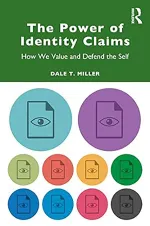This book draws on research in psychology and behavioral economics to show how striving to live up to our identity claims profoundly affects our daily lives. The author argues the claims we make about who we are and what we stand for powerfully influence us, and our social world.
Asking questions such as: Why do people resist the temptation to cheat when cheating would benefit them greatly and no one would find out? Why do people express different beliefs about climate change when they are first reminded of their political affiliation? Why do people prefer to be compensated for donating blood with cholesterol screening than with money? Miller puts forth a novel and compelling argument regarding how strongly our identity claims affect our daily lives. The book provides explanations for many forms of puzzling behavior, such as why people sometimes act against their economic self-interest, how they avoid situations that test their moral identities, and how they respond to failures to live up to their moral identities. It paints an intriguing picture of people’s investment in their identity claims by showing how they seek opportunities to demonstrate their validity, avoid actions and circumstances that challenge their legitimacy, and employ psychological defenses when others challenge their legitimacy.
Based on extensive research in the fields of psychology, economics, and political science, this book is fascinating reading for students and academics interested in identity and the self. It also provides an expanded tool kit for those who seek behavioral change in their organization or community.
